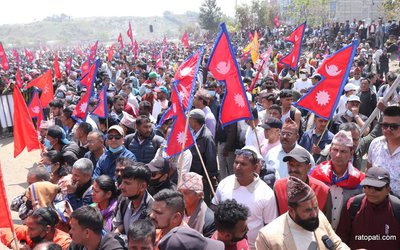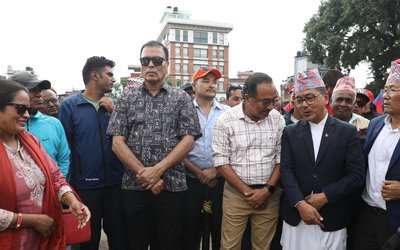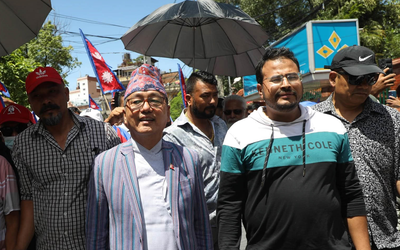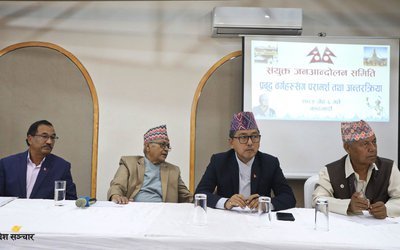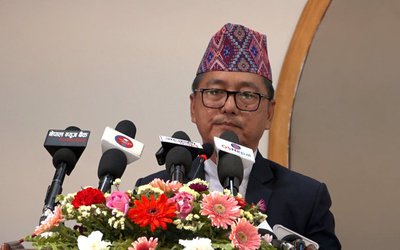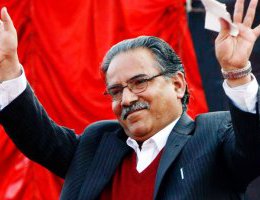
Eleven years ago,
when the then Prime Minister G.P. Koirala and Pushpa Kamal Dahal, chief of the
Maoists who had waged a decade-long war against the state, signed the Comprehensive Peace Accord promising
justice to victims of the conflict, they
probably thought only the monarch(y)
and its loyalists would go on trial. The Truth and Reconciliation Commission (TRC) that was to be formed
in January 2007 — within 60 days of the accord
— took eight years to be formed, almost after all the physical evidence of human rights violations by the
state forces and the Maoists had vanished.
Next February, the tenure of TRC, extended twice already,
will be over. The new government
to be formed after elections this month will have to take a decision on whether to extend the
tenure of TRC. It will also need
to take a call on giving teeth to TRC to try the cases meaningfully. Nearly 61,000 cases have been filed
before the Commission. Given the
fact that its members are nominees of major political parties, TRC is divided on the issue of
granting general amnesty to those
accused of crimes in the civil war.
The Communist Party of Nepal-Maoist Centre, which bears the
Maoist legacy, has formed an
electoral alliance with the Communist Party of Nepal-Unified Marxist Leninist as a junior partner.
The two parties have differed in
the past on their approach to the human rights question. This difference of views had become obvious
soon after the peace accord and is
likely to become a major irritant for the left alliance.
The CPN-UML, which has a large network of affiliated or
supporting NGOs funded by the
international bodies and agencies, has all along been against general amnesty, and even supports trial
by the International Criminal
Court. UML vice-chairman Suhash Nembang, when he was speaker of the House, had instructed the
government to sign the Rome
statute. It was not implemented because of resistance from the Maoists. The Maoists want a pliant or toothless TRC
and seeks a general amnesty for
all those accused of war crimes. The Maoists are also opposed to the Supreme Court taking up rights
violation cases. Dahal’s campaigners in Chitwan, where he is a candidate for
the parliamentary election, told
victims of Maoist atrocities that the monarchy would return if the Supreme Court takes up insurgency-era
cases. During the campaign, Dahal stopped short
of apologizing for the bombing of
a public transport bus by Maoists 22 years ago, in which 42 people were killed and over 70 wounded. “It was a
mistake committed by the party,”
he said while ignoring the survivors demand for justice, including compensation.
The CPN-UML, which was in the forefront of demanding justice
for the victims of the bus tragedy
and other similar incidents, is now silent. Former Prime Minister Baburam Bhattarai, who has since
quit the CPN-Maoist Centre, was
the head of the “peoples’ government” during the insurgency, which used to identify targets or
“class enemies” for the Peoples
Liberation Army (PLA). The PLA, then commandeered by Dahal, would eliminate them.
In fact, the discomfiture has been visible during the
electoral campaign. Senior leaders
of the CPN-Maoist Centre tried to meet some of the survivors and negotiate deals to buy their
silence. The Supreme Court had
awarded Balkrishna Dhungel, a former Maoist legislator, a life-term for the murder of businessman, Ramhari
Shrestha in eastern Nepal. The
Dhungel conviction was the only one of its kind. When Bhattarai was prime minister five years ago, he tried
to annul the judgment through
presidential clemency.
The plan did succeed because of opposition from civil rights groups and the
CPN-UML. Three months ago, Nepal
was elected to the UN Human Rights Council. It gives the country the added responsibility to pursue justice for
victims of rights violations.The sweeping
political changes post 2006 and the peace accord are interlinked, with one
complimenting the other. Major parties including the Nepali Congress, which is likely to end up in the
opposition in this election, have
always been a party to the tacit understanding among major political groups that the peace process be
sidestepped till the constitution
is promulgated.
Post elections, these questions are likely to come to the fore.The CPN-UML will have to clarify where it stands on the human rights issue. If UML stays true to its old position, it will pit the part against the Maoists. The left alliance has a rocky path ahead.
Courtesy: Indian Express

Yubaraj Ghimire
Ghimire is a Kathmandu based journalist.
- Manmohan Singh And The Churn In Nepal
- Jan 08, 2025
- Why ‘Revolutionary’ Communist PM Prachanda Went To Temples In India
- Jun 08, 2023
- Why China Is Happy With Nepal’s New PM
- Jan 03, 2023
- Prachanda Sworn In As PM: New Tie-ups In Nepal, Concern In India
- Dec 27, 2022
- Young TV Anchor As Its Face, RSP Rise Takes Nepal By Surprise
- Nov 23, 2022
